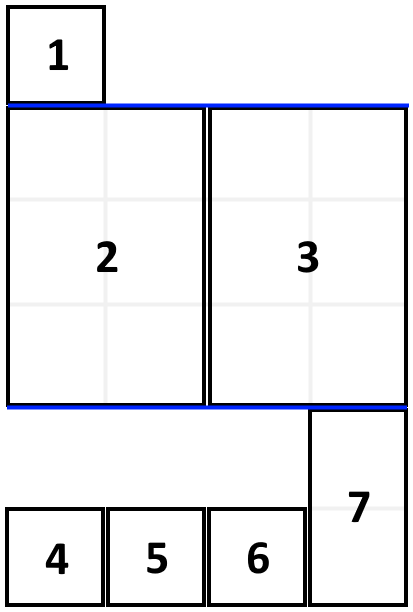| comments | difficulty | edit_url | rating | source | tags | ||
|---|---|---|---|---|---|---|---|
true |
中等 |
2014 |
第 143 场周赛 Q3 |
|
给定一个数组 books ,其中 books[i] = [thicknessi, heighti] 表示第 i 本书的厚度和高度。你也会得到一个整数 shelfWidth 。
按顺序 将这些书摆放到总宽度为 shelfWidth 的书架上。
先选几本书放在书架上(它们的厚度之和小于等于书架的宽度 shelfWidth ),然后再建一层书架。重复这个过程,直到把所有的书都放在书架上。
需要注意的是,在上述过程的每个步骤中,摆放书的顺序与给定图书数组 books 顺序相同。
- 例如,如果这里有 5 本书,那么可能的一种摆放情况是:第一和第二本书放在第一层书架上,第三本书放在第二层书架上,第四和第五本书放在最后一层书架上。
每一层所摆放的书的最大高度就是这一层书架的层高,书架整体的高度为各层高之和。
以这种方式布置书架,返回书架整体可能的最小高度。
示例 1:
输入:books = [[1,1],[2,3],[2,3],[1,1],[1,1],[1,1],[1,2]], shelfWidth = 4 输出:6 解释: 3 层书架的高度和为 1 + 3 + 2 = 6 。 第 2 本书不必放在第一层书架上。
示例 2:
输入: books = [[1,3],[2,4],[3,2]], shelfWidth = 6 输出: 4
提示:
1 <= books.length <= 10001 <= thicknessi <= shelfWidth <= 10001 <= heighti <= 1000
我们定义
考虑
- 如果这本书单独摆放在新的一层,那么有
$f[i] = f[i - 1] + h$ ; - 如果这本书可以与前面的最后几本书摆放在同一层,我们从后往前枚举同一层的第一本书
$boos[j-1]$ ,其中$j \in [1, i - 1]$ ,将书的厚度累积到$w$ ,如果$w \gt shelfWidth$ ,说明此时的$books[j-1]$ 已经无法与$books[i-1]$ 摆放在同一层,停止枚举;否则我们更新当前层的最大高度$h = \max(h, books[j-1][1])$ ,那么此时有$f[i] = \min(f[i], f[j - 1] + h)$ 。
最终的答案即为
时间复杂度
class Solution:
def minHeightShelves(self, books: List[List[int]], shelfWidth: int) -> int:
n = len(books)
f = [0] * (n + 1)
for i, (w, h) in enumerate(books, 1):
f[i] = f[i - 1] + h
for j in range(i - 1, 0, -1):
w += books[j - 1][0]
if w > shelfWidth:
break
h = max(h, books[j - 1][1])
f[i] = min(f[i], f[j - 1] + h)
return f[n]class Solution {
public int minHeightShelves(int[][] books, int shelfWidth) {
int n = books.length;
int[] f = new int[n + 1];
for (int i = 1; i <= n; ++i) {
int w = books[i - 1][0], h = books[i - 1][1];
f[i] = f[i - 1] + h;
for (int j = i - 1; j > 0; --j) {
w += books[j - 1][0];
if (w > shelfWidth) {
break;
}
h = Math.max(h, books[j - 1][1]);
f[i] = Math.min(f[i], f[j - 1] + h);
}
}
return f[n];
}
}class Solution {
public:
int minHeightShelves(vector<vector<int>>& books, int shelfWidth) {
int n = books.size();
int f[n + 1];
f[0] = 0;
for (int i = 1; i <= n; ++i) {
int w = books[i - 1][0], h = books[i - 1][1];
f[i] = f[i - 1] + h;
for (int j = i - 1; j > 0; --j) {
w += books[j - 1][0];
if (w > shelfWidth) {
break;
}
h = max(h, books[j - 1][1]);
f[i] = min(f[i], f[j - 1] + h);
}
}
return f[n];
}
};func minHeightShelves(books [][]int, shelfWidth int) int {
n := len(books)
f := make([]int, n+1)
for i := 1; i <= n; i++ {
w, h := books[i-1][0], books[i-1][1]
f[i] = f[i-1] + h
for j := i - 1; j > 0; j-- {
w += books[j-1][0]
if w > shelfWidth {
break
}
h = max(h, books[j-1][1])
f[i] = min(f[i], f[j-1]+h)
}
}
return f[n]
}function minHeightShelves(books: number[][], shelfWidth: number): number {
const n = books.length;
const f = new Array(n + 1).fill(0);
for (let i = 1; i <= n; ++i) {
let [w, h] = books[i - 1];
f[i] = f[i - 1] + h;
for (let j = i - 1; j > 0; --j) {
w += books[j - 1][0];
if (w > shelfWidth) {
break;
}
h = Math.max(h, books[j - 1][1]);
f[i] = Math.min(f[i], f[j - 1] + h);
}
}
return f[n];
}public class Solution {
public int MinHeightShelves(int[][] books, int shelfWidth) {
int n = books.Length;
int[] f = new int[n + 1];
for (int i = 1; i <= n; ++i) {
int w = books[i - 1][0], h = books[i - 1][1];
f[i] = f[i - 1] + h;
for (int j = i - 1; j > 0; --j) {
w += books[j - 1][0];
if (w > shelfWidth) {
break;
}
h = Math.Max(h, books[j - 1][1]);
f[i] = Math.Min(f[i], f[j - 1] + h);
}
}
return f[n];
}
}